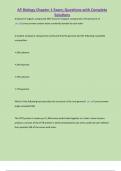Summary
Summary Organizational Psychology - Section A
- Institution
- University Of Cape Town (UCT)
Introduction to I/O Psychology (BUS1007S) This document covers Section A with detailed definitions and includes: Roles of I/O Psychologists - What do they do? The "I" in IOP - Industrial vs. Organizational. Context of IOP Emergence - Historical backdrop. War and Early IOP - WW1 and ...
[Show more]




